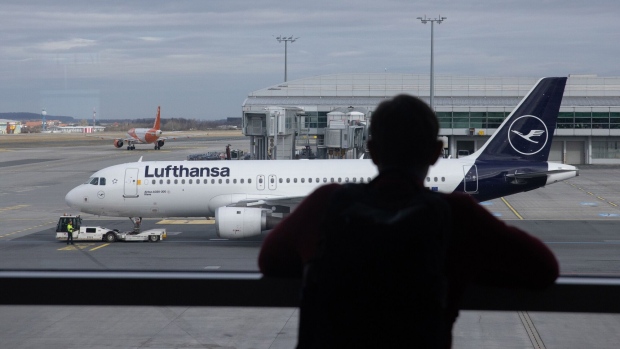Feb 19, 2024
Lufthansa Faces EU Warning Shot Over $350 Million ITA Deal
, Bloomberg News

(Bloomberg) -- Deutsche Lufthansa AG’s €325 million ($350 million) investment in Italian carrier ITA Airways is under threat from European Union merger watchdogs unless it fixes a list of competition concerns set to be handed down by regulators.
The European Commission is gearing up to issue a so-called statement of objections cataloging certain risks arising from the deal, according to people familiar with the matter.
The formal warning — increasingly common in complex or potentially troublesome transactions — could come before the authority’s Easter break in late March, said the people, who asked not to be named because the process isn’t public.
Aside from warning about possible reasons for a veto, such filings typically flag potential ways forward to avoid such a scenario. In airline deals, this can include a remedy to share or give up routes to rival airlines, as well as a potential divestment of assets.
Under the terms of the rescue plan, Cologne-based Lufthansa would initially buy 41% of the successor to failed flagship Alitalia from the Italian state, with an option to acquire the rest later. The transaction marks the latest attempt to resurrect the ailing Italian carrier, which officially ceased operations in 2021.
While the Italian government earmarked as much as €3 billion in support for the new airline, the EU allowed a capital injection of €1.35 billion under its state-aid regime.
Lufthansa and the Brussels-based commission declined to comment. The EU watchdog has until June 6 to reach a final decision in its review.
A spokesperson for ITA Airways highlighted the firm’s split with Alitalia, noting that ITA has achieved a 67% increase in its revenue last year.
Move Quickly
Last year, Italian Prime Minister Giorgia Meloni pressed the commission to move quickly on its review in order to lessen the load on Italian taxpayers.
As part of an in-depth probe, which began in late January, EU watchdogs said they had concerns over both short- and long-haul flights from Italy. They also highlighted how routes between Italy and North America could be affected and whether flights provided by Lufthansa and its partners United Airlines and Air Canada should be treated as a single entity.
Potential solutions, previously reported by Bloomberg, include the disposal of slots at Milan Linate airport, which is dominated by ITA and the wider Lufthansa group, encompassing Swiss, Austrian and Belgian regional units.
Last month, Ryanair Holdings Plc Chief Executive Officer Michael O’Leary said his firm would emerge as a winner from the tie-up, if the Irish low-cost airline took up slots relinquished to win antitrust approval.
The EU has increasingly been on the lookout for more robust airline concessions. A recent EU approval of Korean Air Lines Co.’s 1.8 trillion won bid for smaller rival Asiana Airlines Inc. secured remedies that included the divestment of Asiana’s cargo business, as well as a commitment to allow rival airline T’Way to provide flights on routes between Seoul and Barcelona, Paris, Frankfurt, and Rome.
As the EU’s investigation into Lufthansa’s deal progresses, Brussels regulators are also probing IAG SA’s €400 million purchase of Spanish airline Air Europa.
(Updates with details of support for ITA and comment from airline starting in sixth paragraph)
©2024 Bloomberg L.P.


